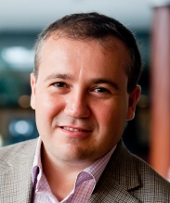Back to Editor profile » Dr Utkan Demirci
Dr Utkan Demirci

Dr Utkan Demirci
Editor-in-Chief: Dr. Utkan Demirci
Dr. Utkan Demirci is an associate professor with tenure at the Stanford University School of Medicine, Palo Alto, CA. Before Stanford, he was Associate Professor of Medicine and Health Sciences and Technology at the Harvard Medical School (HMS) and Massachusetts Institute of Technology (MIT) Health Sciences and Technology (HST) division. He received his bachelor’s degree (summa cum laude) from the University of Michigan, Ann Arbor, his master’s degrees in Electrical Engineering in 2001 and in Management Science and Engineering in 2005, and his doctorate in Electrical Engineering in 2005 all from Stanford University. Dr. Demirci received IEEE EMBS Early Career Award; IEEE EMBS Translational Science Award; NSF CAREER Award; Coulter Foundation Early Career Award; HMS-Young Investigator Award, and Chinese National Science Foundation International Young Scientist Award. In 2006, he was selected to TR-35 as one of the world’s top 35 young innovators under the age of 35 by the MIT Technology Review.
Dr. Demirci has published over 100 peer-reviewed publications in journals, in addition to 150 conference abstracts and proceedings, 14 book chapters, and four edited books. Further, he has given over 100 national and international presentations including invited and keynote at various academic, governmental, and industrial institutions. During the past two years, his research has been cited over 1,600 times. His work has been highlighted in Nature News, Newsweek, Science Daily, Wired Magazine, Nature Photonics, Reuters News, MIT Technology Review Magazine, AIP News, BioTechniques, and Biophotonics. He is the Editor-in-Chief for the Advanced Health Care Technologies journal. He has served as an associate editor and a theme chair for various conferences including IEEE Engineering in Medicine and Biology Society (IEEE EMBS) and Biomedical Engineering Society (BMES).
Dr. Demirci’s laboratory has a strong and scholarly track record of multiple creative innovations. His work focuses on creating innovative micro/nanoscale technologies to understand, diagnose, monitor, and treat disease conditions. His expertise is uniquely positioned at the interface between engineering and medicine to address fundamental biological and clinical questions. In this interdisciplinary space at the interface of engineering, biology, medicine, his work interfaces cells in miniature systems that enable applications for point-of-care (POC) diagnosis, monitoring of infectious diseases, and early detection of cancer. These applications are unified around his expertise to push the limits of cell manipulation by establishing broadly applicable platforms to detect and investigate diseases and provide solutions for real-world challenges by forging the link between technology, biology, and medicine.
